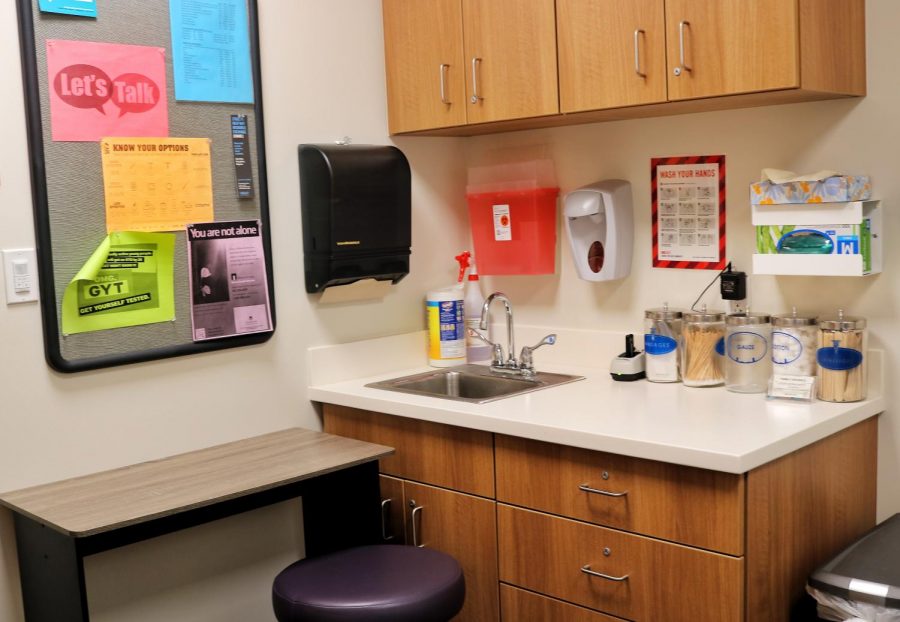Outsourcing Affects Student Health Accessibility
Students seeking care from Student Health Services have faced long wait times since Oberlin outsourced health services to University Hospitals this past summer.
Since the College’s decision to outsource Student Health Services to University Hospitals Health System, many students have complained about long wait times and a lack of available appointments at Student Health Services. This summer, when the College announced the outsourcing, the College said they would be able to offer expanded hours using the UH resources.
The shift to UH, made in order to meet the increased demand for services due to the pandemic, has led to some students to waiting multiple days to obtain tests and appointments for COVID-19 and other health issues. Student Health is currently searching for an additional registered nurse to help address the large influx of students seeking health care and COVID-19 tests.
“As Oberlin entered a second academic year under the threat of this pandemic, leadership felt that students would be best served and the health and safety of our fully occupied campus best maintained if Student Health was closely affiliated with a major local health care system,” Chief of Staff David Hertz wrote in an email to the Review. “Implementing this transition and meeting the medical needs of our students in the midst of the pandemic has been challenging. … We are discussing the most effective approach to bringing specialists on campus on an intermittent basis, even as we consider how Student Health will play an even larger role in the campus’ response to both the Delta and Omicron variants.”
University Hospitals Administrator Gene Hartman replaced former Medical Director Cristal Tomblin, who was not asked to reapply after her position was terminated during the switch. According to Hartman, the shift has created challenges for UH as they adapt to providing services to the College and an increased student population this fall. Additionally, Hartman stated that the Student Health Center is different from many of the other institutions he serves in his role.
“This is a unique situation for me,” Hartman said. “Most of my offices are physician offices where you have three or four or five doctors with a full staff — they see patients every day. Here, there is a lot unknown because of the nature of the campus, … the school, and the students. … It’s a learning process, and we’re a few months in.”
For College second-year Becca Galbraith, the long wait time for an appointment meant that she was unable to use Student Health Services to get a prescription and instead had to have a roommate pick up generic, over-the-counter medication from a pharmacy.
“I was hoping to schedule an appointment for an ointment prescription, but they said they were all booked,” Galbraith said. “This was on a Friday, and they said their next available appointment was on a Wednesday. What I ended up doing is having my roommate go to CVS and pick up the ointment.”
Galbraith also said that she struggled to get an appointment with the Counseling Center for a psychiatrist, which interfered with her ability to receive adequate health care.
“At the end of October, I went to the front desk and asked how soon I could schedule an appointment,” Galbraith said. “I was told the next available appointment was not until December. I had to wait [over] a month to see a psychiatrist.”
Similarly, College second-year Ben Reider encountered scheduling issues when he was trying to receive COVID-19 testing. Despite multiple requests, he was unable to obtain a COVID-19 test from Student Health even after reporting his symptoms.
“I remember, this was a Tuesday night,” Reider said. “I’m feeling really sick. On Wednesday, I didn’t go to class and went to the Student Health Center and told them I wasn’t feeling well. I asked for a COVID test, but they said they didn’t have any time slots until Friday. Later on Wednesday, in the afternoon, I go to Hales to try to get a COVID test, but they said, ‘No, you’re vaccinated.’”
After unsuccessfully trying to obtain an at-home test from CVS and Walmart, Reider went back to Student Health one last time, but they were still unable to test him. Finally, Reider went to Mercy Allen Hospital, where he tested positive for the flu.
Despite many students reaching out to community resources like Mercy Allen Hospital or the Oberlin Public Library for COVID-19 tests, Hartman emphasized that it was not common for students to be referred outside of the College for testing.
“Without knowing the specifics of that case, I don’t think it’s standard practice for students to be referred to Mercy,” Hartman said.
The limited staff available at Student Health along with the influx of students seeking care has prompted the search for an additional registered nurse.
“We could probably use an additional RN to support our providers here, and they can function at a higher level than a medical assistant,” Hartman said.
Hartman also reiterated that regardless of staffing needs, the Student Health Center is committed to helping students who come in without appointments, even though they do not advertise walk-ins. He emphasized that Student Health employees remain devoted to serving students despite the challenges they’ve been facing.
“I can tell you that [the employees’] compassion for the students on this campus is enormous,” he said.







